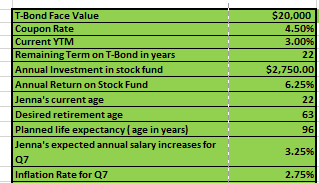Question
Adams fellow graduate, Jenna, has been trying to decide how much of her new salary she could save for retirement. Jenna is considering putting $2,750
Adams fellow graduate, Jenna, has been trying to decide how much of her new salary she could save for retirement. Jenna is considering putting $2,750 of her monthly savings in a stock fund. She just turned 22 and has a long way to go until retirement at age 63, and she considers this risk level reasonable. The fund she is looking at has earned an average of 6.25% over the past 15 years and could be expected to continue earning this amount, on average. While she has no current retirement savings, eight years ago Jennas grandparents gave her a new 30-year U.S. Treasury bond with a $20,000 face value with 4.5% semiannual coupons.
Jenna wants to know her retirement income if she both (1) sells her Treasury bond at its current market value and invests the proceeds in the stock fund and (2) saves an additional $2,750 at the end of each year in the stock fund from now until she retires. Once she retires, Jenna wants those savings to last until she is 96.
7. Jenna expects her salary to grow regularly. While there are no guarantees, she believes an increase of 3.25% a year is reasonable. She plans to save $2,750 the first year, and then increase the amount she saves by 3.25% each year as her salary grows. Unfortunately, prices will also grow due to inflation. Suppose Jenna assumes there will be 2.75% inflation every year. In retirement, she will need to increase her withdrawals each year to keep up with inflation.
a. How much money will Jenna have at her retirement?
b. How much can she withdraw at the end of the first year of her retirement in todays dollars?
Jenna's retirement income if she sells her T-bonds with face value identified below and invests the proceeds in the stock market at a return identified below and saves an additional amount identified below at the end of each year in a stock fund for 42 years. Jenna wants those retirement savings to last to the age specified in the data table below.


Step by Step Solution
There are 3 Steps involved in it
Step: 1

Get Instant Access to Expert-Tailored Solutions
See step-by-step solutions with expert insights and AI powered tools for academic success
Step: 2

Step: 3

Ace Your Homework with AI
Get the answers you need in no time with our AI-driven, step-by-step assistance
Get Started


